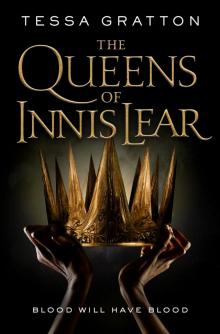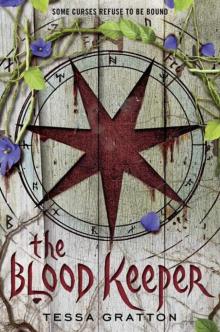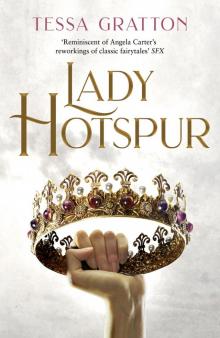- Home
- Tessa Gratton
The Queens of Innis Lear Page 6
The Queens of Innis Lear Read online
Page 6
“Yes, my lord,” Ban said quietly, familiar with his father’s abrupt conversational shifts.
“Well then, look on him as a friend.” Errigal grinned, turning his body and clasping his other hand upon Kayo, forming himself into a bridge between them.
“I shall, Father,” Ban murmured, turning his own eyes back to the Oak Earl. They had met before, a long time ago. In the White Forest, high to the north, before Ban’s mother had shooed him away.
“I’m glad to see you again, Ban,” Kayo said, offering his arm. Ban stripped off his glove quickly and took Kayo’s bare hand. Kayo continued, “I’d like to hear more about the exploits of the Fox of Aremoria.”
“That I can do, my lord,” Ban said, letting a smile of pride creep over his face. The Oak Earl had heard of him. Not as the bastard, but as the Fox.
“The Fox of Lear,” Errigal protested.
In their youth, Ban had once bested Rory and all the other boys their age at a racing contest, because Ban dared to leap across a neck-breaking gully instead of scrambling down and up again. The king of Innis Lear had tossed the prize of woven flowers at him as Errigal had said, “So much more willing to risk his life for the win than the others,” as if he approved. It was heard by Lear, who scoffed and said Ban’s life was worth less than the other boys’, so he should of course be more willing to risk it.
Ban opened his eyes and jerked off his other glove. His father was weak for never standing up to Lear on his own son’s behalf, but the king was the true enemy.
Unwilling to retreat, and thinking of how best to play the fox in this squalid henhouse, Ban slid his gaze toward the inner keep again. “Why are the kings of Aremoria and Burgun here?”
“Vying for Elia’s dowry,” Kayo said, leaning his shoulder against the black stone wall. “Though not so much for herself, it seems to me.”
Errigal barked a laugh. “So it should be, for a third daughter.”
Ban had heard as much from Morimaros weeks ago, but standing here now, so near her, the thought of her being wed made his tongue go dry. He had no right to care on her behalf.
“It will all be done tomorrow,” Kayo told him. “At the Zenith Court. Lear will choose between Aremoria and Burgun.”
“Tomorrow,” Ban said, too hushed to sound uncaring. His father didn’t notice, instead studying a party of soldiers and ladies in bright wool hurrying around behind them toward the third tower. But Kayo heard Ban’s echo, and peered at him.
“Six years it’s been since you saw her?” Kayo prodded gently.
Ban nodded.
“Come on,” Errigal said, clapping both their shoulders again. “I want a word with Bracoch, to see the lay of alliance and whether he’ll stand with Connley.”
The Oak Earl nodded, but because Ban had been looking, he saw dislike move swiftly through Kayo’s eyes. Interesting.
“You clean yourself up and join us, my boy,” his father ordered Ban. “We’ve rooms up there, can’t miss the Errigal banner. Be at dinner in the hall, too, if you want to see the princess before she’s a wife. This one,” he said to Kayo, “used to trail behind Elia, all devotion and round eyes. Now I remember it, the king even called him her dog—a tamer sort of fox he used to be, I guess!” Errigal laughed at his own joke.
“Not tame anymore, Father,” Ban said.
“Ha! So like your mother! Stars, I miss her.”
It was on his tongue to remind his father that his mother was easily found, but curse him if Ban would aim Errigal back in her direction.
“Farewell for now, Ban the Fox,” Kayo said gently, as if he knew the storm brewing inside Ban’s chest.
Clenching his fist, Ban closed his eyes and withdrew. It was appalling how easily his father set his teeth on edge, made him want to scrub his face and strip the black from his hair, be as gold-speckled as Rory. But it wouldn’t have mattered: the king, and therefore Errigal, cared only for birth stars and the orders of privilege that came with title and marriage. Ban could have been more handsome and sandy and gilded than Rory, and they would still have scorned him. One truth Ban had always understood about his father: Errigal swung to the winning side, or the loudest side, or the most passionate side, but he was rarely static. As a child Ban had struggled to follow him, to stand next to him, and win some approval. It took years in Aremoria to realize he and his father stood opposite each other across a dark and vicious chasm called legitimacy, and nothing would bridge the gap.
A figure half the yard away caught his attention.
It was her.
Elia Lear, slipping quietly along the inside of the curtain wall, toward the royal tower. She wore the dull regalia of a star priest, gray skirts snapping around her ankles, and worn boots caked with mud. She kept her chin tucked down and her hood held low, as if avoiding attention, but a warm band tightened around his chest. It was her.
She was small, though she had to be twenty, as Ban was. As he stared, her hood slipped back in a gust of wind and her hair fell free in spiral curls, dark brown and copper, shining as if spun from the very metal itself. She gathered it in her hand and tugged the hood back up. Even from this distance her eyes were wide, bright, and black as polished horn beads.
He knew he stood like a dullard, or like useless statuary, and when she did glance his way, her eyes passed over him on their way to the tower. No more than he expected, for though she had grown only more lovely, Ban knew he was harder and sharper than the mischievous slip of a child he’d been. She’d never seen him with a sword before, or with his hair so short and greased, spiked with a few tiny braids. Why would she remember Errigal’s bastard at all, or if she did, give him a second glance?
This sulking was not why he was here.
Ban gritted his teeth and turned away.
ELIA
IT WAS EASY for the youngest princess to make her quick way beneath the arching iron gate of the outer wall and across the muddy inner ward, full of people going about their day. Head ducked to hide her face and hair beneath the undyed gray wool of her cloak, and otherwise unremarkable in the drab dress of a star priest, she ignored the new construction on the north wall and avoided the maids and retainers she knew, so as not to be stopped. It was overcrowded, and smelled it, for the high keep walls blocked most fresh air from the ocean, and the number of people was nearly double that of the Summer Seat’s usual residents, thanks to the kings of Aremoria and Burgun.
She’d seen their banners from the high coast road as she and Aefa and a trio of soldiers from Dondubhan approached. Dreading meeting any other king before she’d reconnected with her father, Elia had abandoned Aefa and the soldiers to sneak alone into the keep, safely incognito in her priest robes. The retainers she could not avoid at the gate nodded solemnly when she bade them keep her secret.
The narrow passages of the inner keep had been built of rough black rock generations ago, tight for security and lacking windows but for regular arrow slits. Golden hay covered the stone floor of the family hall, rather more dusty than usual. Elia climbed the curling staircase up the first tower, hood falling entirely off her curls. She passed retainers lounging lazily in a guard hole, sharing a meat pie between them; one even had a smear of gravy marring the star on his blue tabard. They sprung to attention at her judgmental glance, muttering fast apologies, but Elia did not stay to chide them or make them glad it was not her sisters who’d caught them relaxing. The corridor near her father’s chamber widened, and a sharp ocean breeze pushed through the arched windows cut wide enough for a face to peer out. Several dogs piled in a corner, stinking of mud and meat. They wagged their tails at her as she passed.
Wishing she’d paid more heed to the state of the keep as she snuck in, Elia frowned. Her father had kept a clean home all Elia’s life. Smelly dogs had been roped in the kennels, near the goat pens, and retainers ate in the retainers’ hall on the eastern edge of the yard. She resisted the temptation to veer off into the guest tower or the great hall to make certain they were still presentable for the visit
ing kings. Or presentable at all! Her own people deserved a Summer Seat well-tended and bright.
Worry dragged her heels and she scuffed the thin soles of her boots on the stone floor, shoving aside seeds and dirt. Ahead, at her father’s chambers, two more retainers stood, these at least upright, beards braided and belts polished. She approached with her chin up, recognizing one, but not the other. “Seban, is my father fit for me?”
“He is, Lady Elia,” the older retainer said, though some sadness put hesitation in his answer. “Preparing for his next audience, but I’m sure you’ll be more welcome yet.”
Instead of questioning him further, she pushed straight through the door and into the chamber.
Incense sharp and thick greeted her, a familiar sticky scent from the star towers, much too cloudy here. Waving a hand before her face, Elia peered around at the trappings of her father’s anteroom: the hearth burned hot, and incense spirals created the smoke that filled the air, not enough of it fleeing up the chimney. Rugs sprawled over the floor, piled in thick layers. Pillows were strewn about, along with charcoal sticks and flapping star charts. Elia picked a path through them to the arch that led into Lear’s bedroom.
The king of Innis Lear stood before a tall window where the incense cleared, as a maid restitched the cuff on his outstretched arm. His dark blue robe fell from bony shoulders, a heavy hem of velvet and black fur holding the folds in place. Lear murmured to himself, a recitation of star signs in the shape of a child’s poem he’d taught Elia ages ago. The princess mouthed the words with him, not interrupting lest she startle the maid with her needle, or ruin Lear’s patience to let the girl finish her repairs.
This room was less familiar to Elia, though she knew the high oak bed had been there, just so since her mother lived, near the line of three tall, narrow windows overlooking the sheer cliff drop and crashing ocean to the north. A good view for the first evening stars; Lear always preferred to stand there watching and waiting for them, alone, after the queen had died. The rugs here were vibrant teals and blues and oranges, even one impossibly rich black, from the Third Kingdom; the dyes had been imported at great expense for the queen’s pleasure, and though most of the rugs were threadbare now, Lear refused new ones. Only the wall tapestries were woven in styles of Innis Lear, with star-spotted trees and rampant swans. Lear’s desk pushed unused against the far stone wall, covered in letters and ink pots. There the curtained door led to his private privy down three stairs, hanging over the cliffs.
“Are you nearly finished?” The king broke halfway through a verse of his poem, testy and wrinkling his long nose.
“Yes, sir,” the girl replied, tying off her thread as quickly as her fingers could manage.
Elia smiled and stepped farther in, inviting her father’s irritated “What now?” and the sewing girl’s obvious relief.
“Hello, Father.”
“Elia!”
The king regularly wore his age-spotted brow in furrowed gloom, melancholy drawing dark lines about his thin mouth and lengthening his already long, rectangular face. But now Lear smiled so brightly that his lost handsomeness shone through for a brief moment. He held out large white hands, entirely consuming Elia’s small brown ones, and drew her in for an extended embrace, tucking her head beneath his chin. Elia could feel his ribs through the layers he wore, and while he’d always been thin, this was excessive. She pressed her nose into his collarbone hard for a moment, squeezing away her concern. Her father was old, that was all.
He stroked her hair. “You smell like your mother.”
“It’s the same oil she used,” Elia said, pulling away enough to speak. She tilted her head back. Lear’s own hair was flung high in a mane of brown and wiry silver. A few streaks of almost-beard marred his jaw, though he’d shaved clean all her life. “Seban outside said you’re readying for a meeting? Shall I comb your hair?”
The king studied her smartly. “You are the one in need of grooming if you are to join me at this meeting. It’s with your courting kings.”
Elia winced. “They should meet me thus, Father, plain and myself.”
“If either of them thinks you plain I’ll drive them off the cliff!” Lear kissed his daughter’s forehead and released her. “Tell me of your studies, my star, while this girl…” The king eyed the room, but the girl who’d mended his cuff had vanished. “Stars and…!”
Laughing softly, Elia led the king by his hand to sit upon a chair with a simple, sturdy back. “I’m glad to attend you, Father.”
“My loyal Calpurlugh,” he said, sighing as Elia gathered a horn comb off the narrow table along the wall that was covered in odds and ends: combs and rings, a beaten copper chain, tiny crystals arrayed like constellations, ribbons and buttons and a hood missing the loops to tie it to a tunic.
Elia told her father then the story she’d perfected on the journey south: her wager with Danna her tutor, the win, the twist—that most of the retainers at Dondubhan had sided with her despite her comparative inexperience. Lear slapped his knee, pleased, and his still-bright blue eyes closed as Elia’s fingers and the comb pulled his thick hair back from his forehead and drooping ears. She wound it into a single braid and twisted it into a knot, pinning it with the same horn comb. Several of the rings on the table belonged on his fingers, especially the sapphires, and she dropped them into his palm.
“Your turn,” he said, trading places with her. “I’ve a winning idea, Calpurlugh.”
Obediently, Elia sat, hands folded in her lap.
“We shall leave you clad in this plain star priest gown, and bring you with me to this meeting with Aremoria and Burgun. Will they see their sought princess, or only a servant of heaven?”
Though her father’s smile was large and infecting, Elia was not enthusiastic. “Should we play games, Father? They might be offended.” Her thoughts drifted to those last letters she’d received, and she wondered if Ullo was capable of seeing past an unadorned dress, or if Morimaros of Aremoria had been honest when he said he wished for a star reading.
“And what should happen then?” Lear raised spiky brows. “A retreat? If either king is so easily put off of you, then now is the time to discover it. They will not attack us; they will not risk their trade with the Third Kingdom, nor the access to our rubies and gold and iron.”
It was true Innis Lear was rich in resources and minerals, and their location put them between sea trade and Aremoria, though Aremoria could always trade overland with the vast desert kingdoms to their south and east. It was also true Aremoria would risk any trade they established with the Third Kingdom if they consumed Lear, dethroning Dalat’s line, which was also the line of the empress. And Burgun couldn’t defeat Lear if they tried. Alliances mattered much more to their small country. But Elia had no intention of marrying either king, and so she supposed she could play along.
“Very well, Father,” Elia said, and Lear’s smile spread into a wicked old grin. With a groan he knelt, reaching under the low oak frame of his bed. Before she could offer aid, he made a sound of triumph and dragged out a small clay pot.
“Is that oil? It must be rancid now.” Elia leaned away.
Her father started to stand, then shook his head and gave up without much effort. He handed the pot to her. “Open it.”
The orange glaze and black rim proved the pot to be from the Third Kingdom, but it was small enough to fit easily in her hands. She pried off the lid, where wax still clung from an old seal. The lingering perfume of bergamot oranges brought tears to her eyes. She was used to the smell, for her uncle the Oak Earl bought copious amounts in trades on her behalf, just as he had for Dalat over the years. But this, surely, had been a pot touched and admired by her mother. Those gentle hands had caressed this smooth glaze, cupped the base as gently as Elia did now.
Inside curled a thin chain of silver woven into a delicate net, and studded with tiny diamonds—no, merely island crystals, but in Elia’s palm they glinted like shards of fallen stars. “Father,” she whispered,
just barely remembering Dalat’s hair bound tight in a thick roll that curved from ear to ear, along her nape, and dotted with the same tiny sparkling lights.
“This will be enough of a crown, my little love, my favorite.” Lear stood very slowly, but Elia was too stunned, admiring the sleek dripping silver, to notice in time that he needed aid to rise. The king moved behind her and put his hands on her shoulders. “I remember how to do it, though it has been so many … long years.”
Elia closed her eyes, flattening her hands on her stomach. This would infuriate her sisters when they saw, for both would demand this artifact of their mother for themselves. Gaela because she felt she deserved all Dalat’s mementos, because they’d been the closest, because she was the eldest and would be queen; Regan because she liked to deny Elia small things, and as ever would support Gaela’s claim.
No doubt Lear had hidden it in the tiny clay jar in order to keep it to himself. And now, he set it where he willed it, upon his favorite daughter’s head. All beings shall in their proper places be set, he’d written in his letter. A sliver of worry slid coldly through Elia’s heart. But Lear’s slow, steady hands soothed her, as he twisted her hair into a long smiling roll, and her shoulders relaxed. His tugs were more tentative than Aefa’s, and the story he told as he worked was a story Elia had heard before: the first time Dalat had agreed to allow her husband to braid her hair, and the terrible time they’d both had of it, neither giving up for hours and hours, until Lear had made such an utter mess Dalat had burst into tears.
“I was devastated, of course,” Lear said, as he always did, “but not nearly so much as your mother. When Gaela was born, we learned together, though Gaela declined to sit still, and then Regan’s hair was easy. By the time you were born, I was nearly an expert, even Satiri said so.”

 The Apple Throne
The Apple Throne Blood Magic
Blood Magic The Lost Sun
The Lost Sun The Strange Maid
The Strange Maid The Queens of Innis Lear
The Queens of Innis Lear The Blood Keeper
The Blood Keeper Night Shine
Night Shine The Weight of Stars
The Weight of Stars Lady Hotspur
Lady Hotspur Blood Magic (The Blood Journals)
Blood Magic (The Blood Journals)